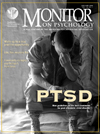 |
On PTSDLetter to the editor of the American Psychological Association Monitor, published in the March 2008 issue.
However, I was concerned by the Institute of Medicine's critique that evidence-based outcome studies are too often being conducted by researchers with theoretical ties to the method being studied. It is true that certain researchers showing efficacy of a particular approach are practitioners of that approach, so self-fulfilling prophecy determines which methods get approved as evidence-based. These methods then become part of training programs on PTSD, and students continue to document the efficacy of the method. Further, a high drop-out rate is endemic to studies on PTSD; this raises the question of what can truly assess the efficacy of methods used to address PTSD. One problem is that the definition of PTSD is recent. It is mostly defined in concrete behavioral or physiological terms, and the research that captures these symptoms is reductionistic. Lost is the complex human phenomenon of PTSD; it is not a set of symptoms, but a lived experience that includes -- as well as the physiological and psychological disruptions -- disruptions in one's worldview, culture and sense of belonging, disruptions to a sense of meaning and coherence, and all kinds of collateral damage to family, friends and social contexts. The kinds of research that can address this multi-layered phenomenon are narrative, phenomenological, nonverbal and in-depth, single-case designs. Treatment must also reflect the multiplicity of the phenomenon. Recommended is a whole-person approach to trauma that takes into consideration existential, religious and cultural factors. ILENE A. SERLIN, PHD |
 I APPLAUD THE timeliness of your focus on post-traumatic stress disorder (PTSD) in the January issue and the recommendation that psychologists be trained to deal with the wave of returning veterans from Iraq and Afghanistan.
I APPLAUD THE timeliness of your focus on post-traumatic stress disorder (PTSD) in the January issue and the recommendation that psychologists be trained to deal with the wave of returning veterans from Iraq and Afghanistan.